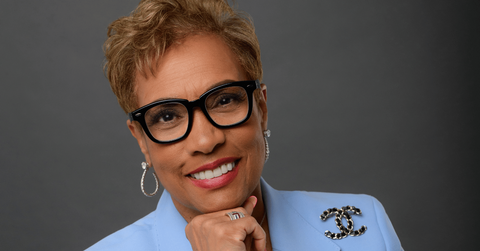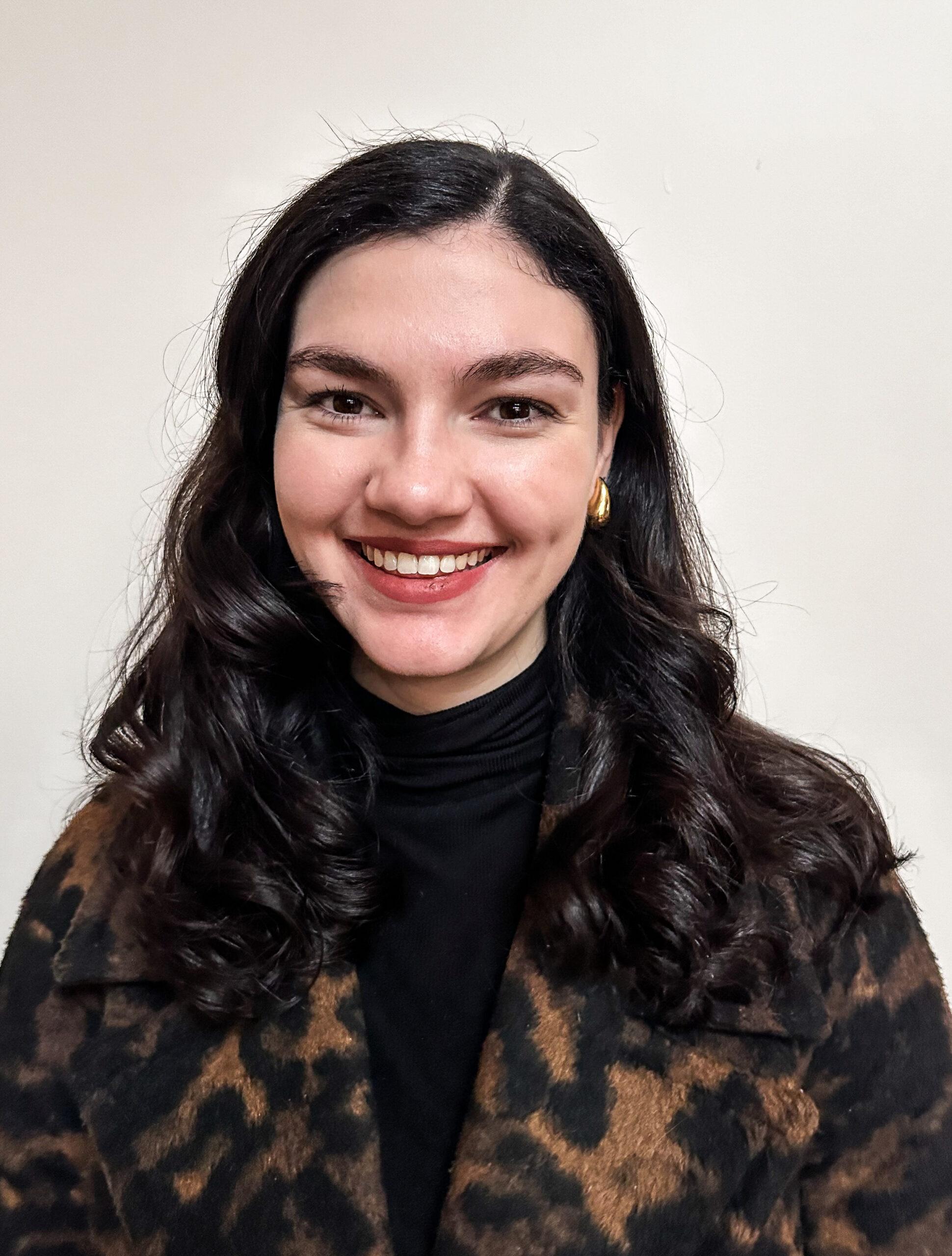In the competitive world of marketing, where campaigns often focus solely on driving consumer purchases, Jacqueline Moore has spent three decades building out the innovative version of a marketing agency. As Chairman and CEO of CMRignite, Jacqueline has built and grown her company to a nationally recognized business dedicated to cause and behavior change marketing, helping clients align their social responsibility with consumer values.
Through health campaigns addressing HIV/AIDS and influenza to rapidly deploy COVID-19 communications during the pandemic, Jacqueline’s agency has consistently focused on work that makes a positive social impact.
As CMRignite celebrates its 30th anniversary this year, Jacqueline sits down with Her Agenda to reflect on the challenges and triumphs of entrepreneurship with refreshing authenticity— acknowledging that leadership is significantly more difficult than it appears, requiring vision, strategic guidance, and calm decision-making during challenging periods.
Dive in to see how Jacqueline has pivoted with the challenges of raising a business, welcoming family into her vision, and what’s on the horizon for her within the next year.
Her Agenda: What inspired you to start CMRignite, and how did you come up with the idea for the agency?
Jacqueline Moore: Primarily, it was an evolution of a company. I started doing business plan consulting for small businesses, small startups, and individuals who were trying to get funding and needed a business plan written. I had recently completed my MBA, so I had the experience of writing a business plan and having to present it to investors. And so I knew the steps to do that and what was needed. And so that’s [what] really sparked it.
Then I ended up with a client as I was taking on those assignments that said, ‘can you implement the plan?’ That was not my intention, but I said if I wrote it, I can implement it. That’s how the company got started and launched.
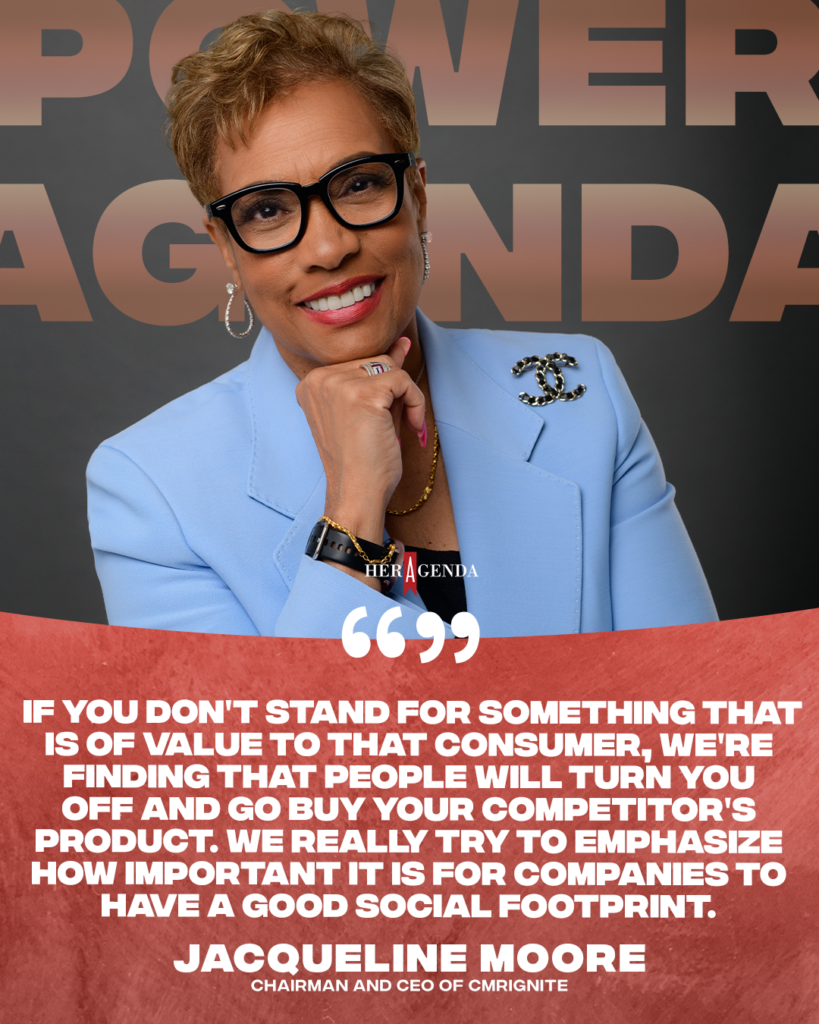
Her Agenda: How did your vision evolve from a small Midwest-based agency to a nationally recognized leader in cause and behavior change marketing?
Jacqueline Moore: We started in our backyard, where we had a network. We knew the landscape and the challenges faced by many of the businesses in Wisconsin.
And then that just expanded. It gave us an opportunity to expand in certain industries, particularly health, because we had done a lot of health-related campaigns. We did HIV and AIDS. We had done influenza—those kinds of things. As we completed those successfully, we were then able to use that to expand nationally.
Her Agenda: What lessons have you learned over the years about leadership and running your own business and how do you implement them in your own business?
Jacqueline Moore:Primarily, what I learned is it’s hard as hell. So it looks a lot easier than it really is.
When you’re a leader, others look to you for a vision, for calm in the midst of a storm. They look for you to provide guidance and strategy around how your services, products, and services will support a client’s needs. It runs the gamut. And so it’s good when you have really good people because leadership is much easier. But sometimes, it can be more difficult depending on the individuals and their particular needs.
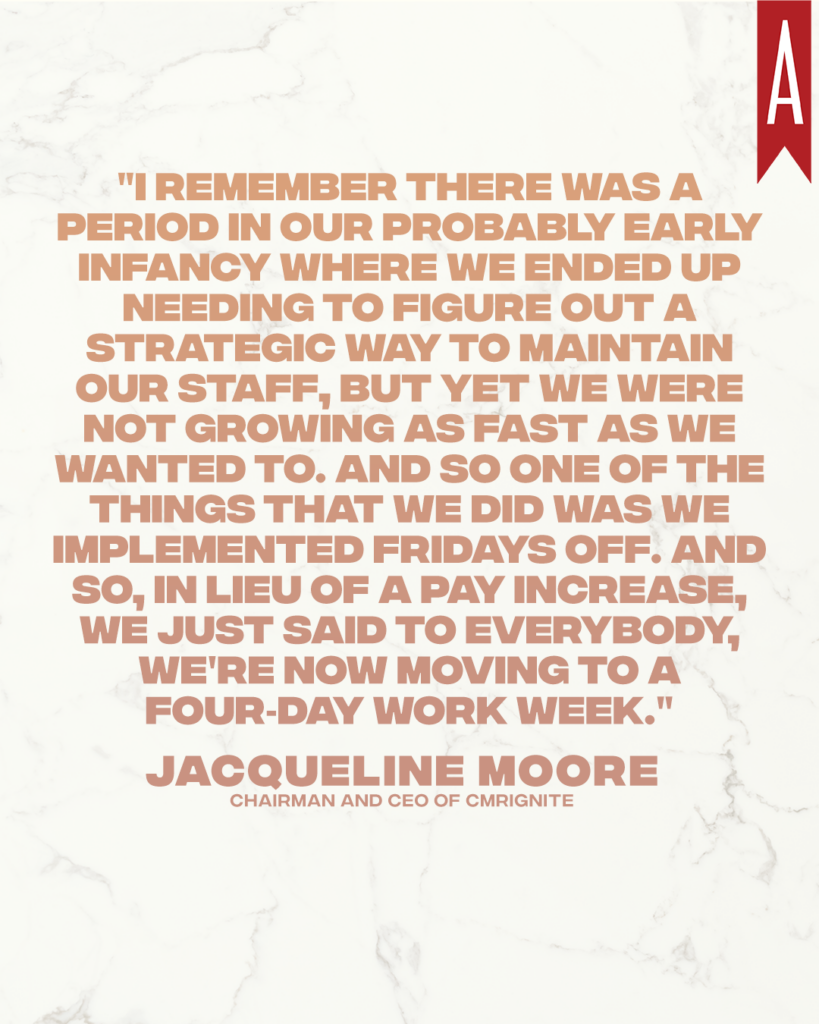
Her Agenda: Is there an example of a time when there have been challenges and you’ve overcome throughout your business?
Jacqueline Moore: I think over the 30 years, we’ve seen periods of where we had to make decisions on do we grow faster or do we stretch with the team that we have.
Those were all very, sometimes very difficult decisions. I remember there was a period in our probably early infancy where we ended up needing to figure out a strategic way to maintain our staff, but yet we were not growing as fast as we wanted to. And so one of the things that we did was we implemented Fridays off. And so, in lieu of a pay increase, we just said to everybody, we’re now moving to a four-day work week.
That was one way of us maintaining the individuals that we had, yet allowing us as a company to position ourselves for more growth. And so it was just one of those things that came out of a genuine discussion with people. Were we able to do this? Or, did folks feel like, no, a raise is so important that I’ll need to leave the company? And so we implemented a four-day work week and it worked out very well. And we were able to maintain our staff.
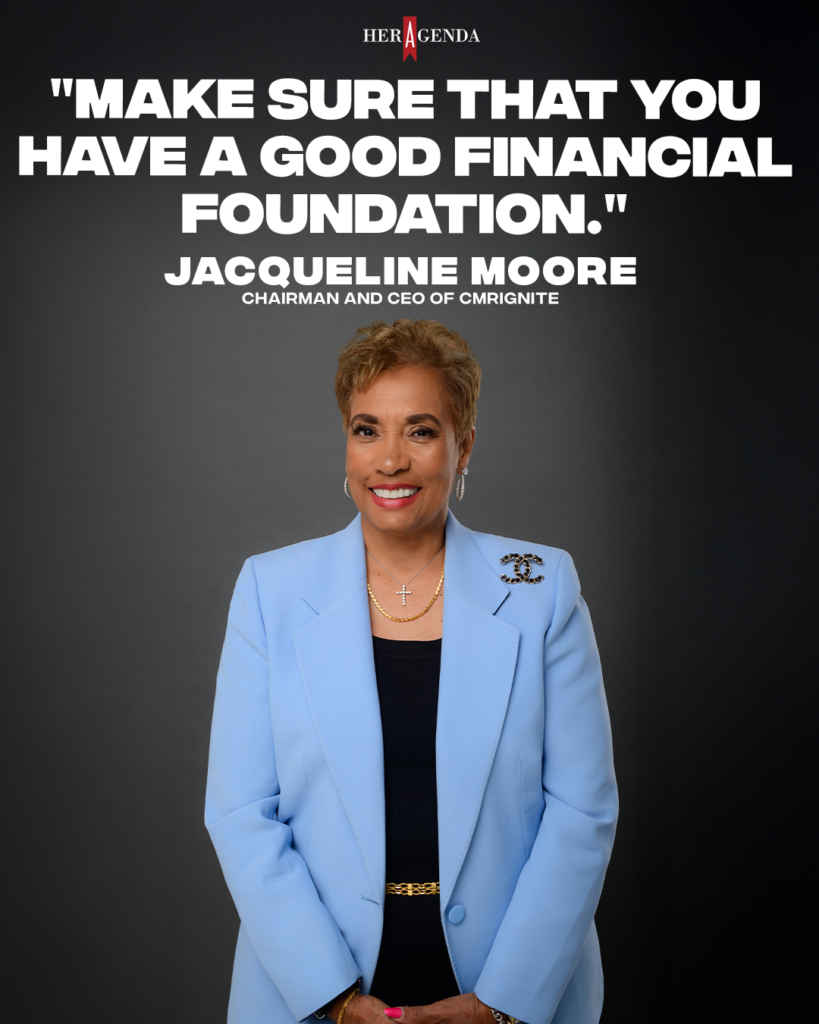
Her Agenda: With nearly 60 full-time employees, how do you foster a work environment that promotes creativity and innovation?
Jacqueline Moore: It is challenging. That’s one of the disadvantages that we had of COVID is that it took us away from being together. There’s something about having the synergy, the energy, all the things that go with social interaction. It does make it more difficult because now everything is done over Zoom or Teams or whatever, but it’s just not quite the same as being in a room with someone and being able to interact with that individual around creative ideas. Sometimes, the creative idea might come after you’ve hung up from the Zoom call. And so now what? Whereas if I’m in an office with you, I’ll just walk over to your desk and just go like, hey, we were just talking about X, so what about if we did this, and let’s finish that conversation impromptu?
It does have its disadvantages, but we’ve managed to really get collaborative teams, pull everybody together, kind of set the framework and then come back together after we’ve let people build on their ideas. However, I’m still a proponent of needing to be in the office some number of days just for social interaction.
Her Agenda: How has having family members involved in your business influenced the company culture?
Jacqueline Moore: I started the business 30 years ago. My kids were young then because they’re not that old. They were still in school and getting through and going to college and those kinds of things. So much of the foundation of the business and the direction, the vision of who we wanted to be was already established. But certainly, having them as part of the company has been a real benefit, particularly for me, because that wasn’t ever the plan.
And so it wasn’t where I designed the business to be a family-run business with a legacy that goes on and on. I always figured they would go do their own thing. When it was time for me to retire, I’d retire, get a little umbrella drink, sit on a beach, and I’d be happy. And so, as a result of having the desire and the passion to be a part of the business, it has really built a legacy and brought in genuine ideas. My children are in their 30s. And so they bring a lot of innovation, a lot of energy to the organization, and certainly can continue on with the culture that I had already established.
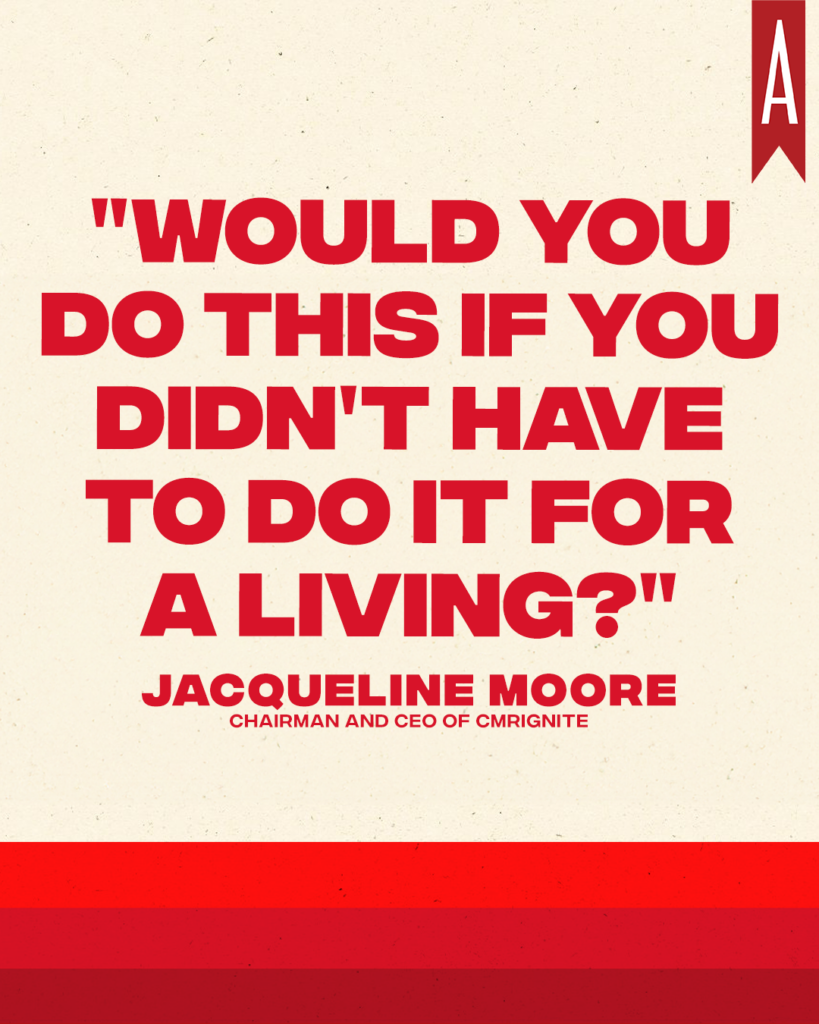
Her Agenda: Can you describe a project or campaign that maybe pushed you and your team outside of your comfort zone? And how did you evolve with it?
Jacqueline Moore: That’s kind of a difficult one because usually the things that we work on, we love, because they are in the sweet spot that we want to be in, which is around social responsibility, how clients’ products and services and their social responsibility impacts an audience.
One of the most challenging ones that we had was probably more recent with some of the COVID work. And it was just because of the fast growth that we had. We had to respond very quickly. So, it didn’t give us a lot of time to think about it or strategize. It was almost a crisis communications kind of campaign where people were dying every day. And so you didn’t have a lot of time to say, let me study this for 30 days and let me do this and whatever. We had to, with our campaign partners, really hit the ground running and do something because we were in the midst of people losing their lives. And so we had to respond quickly. That was probably one of the ones that was a little more of a discomfort based on the way that we normally do things where we have an opportunity or time on our side.
Her Agenda: What do you consider the most important values that have guided you in your entrepreneurial journey?
Jacqueline Moore: There are a couple, but the one that comes to mind is authenticity, being who we are and not being fearful of who we are, knowing what we stand for. Oftentimes what we’ve found more recently is that in studying consumers, consumers are buying more than with the emotion of it looks pretty, it feels good. They’re buying now on what companies stand for. And if you don’t stand for something that is of value to that consumer, we’re finding that people will turn you off and go buy your competitor’s product. We really try to emphasize how important it is for companies to have a good social footprint.
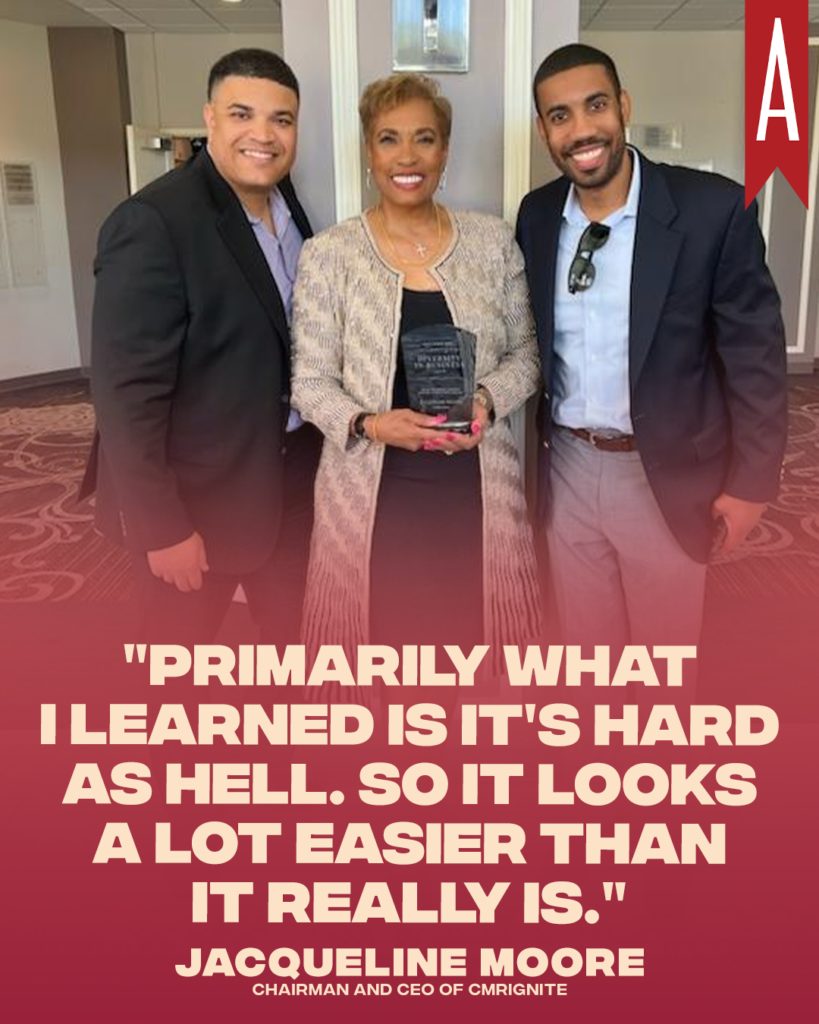
Her Agenda: How do you see the marketing industry changing in the next couple of years, especially with social media?
Jacqueline Moore: I think the interesting part about the shifts that are taking place is that the mediums are shifting how we communicate with people. There are some challenges that I believe are going to take place with that and it’s believability, reliability, and who you can trust. I saw an NBA player that I’m familiar with from the Milwaukee area who died, and I didn’t know whether to believe it. Now that’s pretty sad when we have that kind of skepticism about our news organizations. And so I did confirm that [it was true, and of course] I’m very sorry to hear that.
But one of the other things is just trying to recognize that while the mediums may have changed, our clients demand that we’re able to produce metrics. So it’s not just how many people saw a billboard because however many people saw a billboard doesn’t mean that they made a purchase. And so from that standpoint, we’re looking at new opportunities as we move into social media around whether or not people are actually making purchasing decisions. And so how can we help drive market share in terms of, we know that the things that we’re doing, the kinds of tools that we’re using in our organization can help drive market share increase.
Her Agenda: What advice would you give other entrepreneurs looking to build a successful business in today’s competitive landscape?
Jacqueline Moore: Depending on your longevity, I would, for newer entrepreneurs, someone just getting into the business, I would advise them to make sure that they are prepared and that they understand the financial implications. I kind of laugh sometimes when I have meetings with mentees where I share with them that retained earnings is not cash flow and is retained earnings. There’s a big difference. And so helping them to understand the importance of having a good financial base in terms of, there may be some times in which entrepreneurs want to start in their organization and they want to be the ones to [be able to] make the big salary. You may not be able to do so. And primarily because you need to reinvest those dollars back into the business so that when you do have an opportunity to bid or operate on a large project that you have the funds available so that you can make it until your client pays you. And so that’s one of the things that I noticed even in dealing with small vendors that we have that oftentimes they’re asking us, well, ‘can you pay me up front? Because I don’t have any,’ and frankly, for me, that is a turnoff. So for beginners, I would say, make sure that you have a good financial foundation. And if you have working capital, that’s a great thing.
That’s something that you can sell to a client. If you’ve been in business for 10 to 20 years, I’d say manage your growth in terms of how fast you grow because that can be a detriment to you if you tend to grow too fast. Then that means everything else is out of whack. All the things that you had in place, you know, trying to manage those become chaotic.
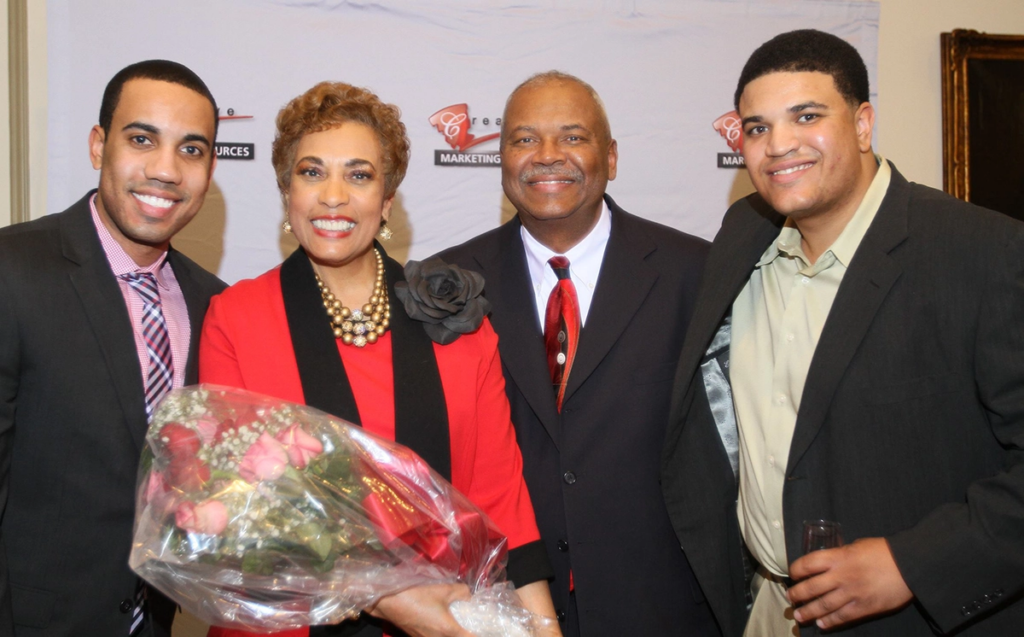
Her Agenda: Do you have any exciting upcoming plans for your agency? Or is there anything you’d like to share about the horizon?
Jacqueline Moore: We’re celebrating 30 years. So we’ve got all kinds of things happening internally in the company. And we’ll share those externally. For example, we’ve asked some of our biggest supporters to do a two-minute video to give us some congratulations. And so that’ll be shared. And I’ve asked some very close friends to help us do that in terms of business associates. Other things that are taking place are that we took our staff to North Carolina.
We were all there to be together, which was nice. It was a retreat where we were not talking about accounts within our organization. We did it so that people could enjoy each other and be together. We usually try to do that annually. We move it to a different city, depending on whether there is more staff in that city. One of the other years, we did it in Dallas because we had a lot of staff there.
But right now, we’re really focused on what our future looks like. How do we get through the next few years with all the changes that are taking place? And how will those impact us, the level of uncertainty? Then, our clients become uncertain about what they’re doing. As leaders, we have to be mindful of the next things that are taking place and make sure that we’re paying attention to that so we can protect the people that we care about. And the trick ought to be, if you were independently wealthy, would you still do this? And that’s always been mine. If I were independently wealthy, and I’m not, but if I were, would I still do this? I would still do it because I love it because I have such a passion for what we do and the kinds of campaigns that we work on. So that’s my test that I [give] everybody. Would you do this if you didn’t have to do it for a living?
[Editor’s note: This interview has been edited for length and clarity.]

